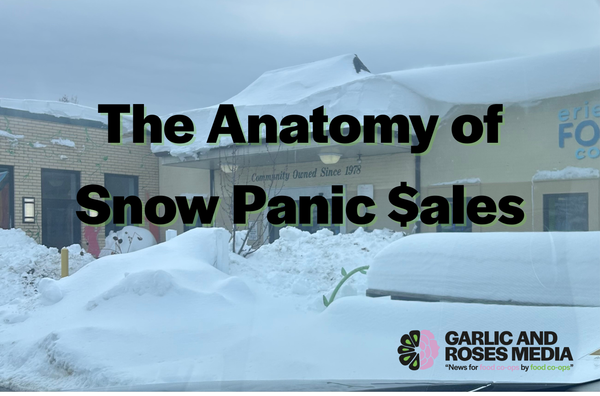Digital Infrastructure for a Truly Cooperative Food System
When food co-ops and producers coordinate through platforms they collectively steward and govern, local food systems can become economically competitive with corporate alternatives while building the solidarity and economic power the movement was designed to create.

The food cooperative movement was built with a strong emphasis on ensuring communities have democratic control over their food systems and equitable access to healthy food. While existing technology platforms often reinforce centralization and extraction, the application of cooperative principles to digital infrastructure opens new pathways for food system coordination on a national scale. The opportunity has never been greater to advance widespread food sovereignty with open-source, cooperatively-owned technology that strengthens our local and regional food systems rather than undermining them.
The Infrastructure Gap
Extractive platforms and fragmented technology tools are preventing the food cooperative movement from achieving its true transformative potential. Individual food co-ops often work in silos when it comes to local sourcing and regional food system development. This lack of supply chain coordination prevents local food systems from achieving the scale needed for greater economic viability. As a result, food co-ops remain largely dependent on the same corporate distribution networks they were founded to challenge, while small and independent producers still struggle to access markets, and communities are left vulnerable to supply disruptions stemming from an overly centralized system.
These systemic barriers persist through procurement systems that favor large distributors over local producers, technology platforms owned by outside investors whose profit motives conflict with cooperative values, and lack of coordination between co-ops that inhibits collective negotiation with regional suppliers or shared transportation costs.
Working in isolation has real costs that compound across the cooperative network. Staff spend time on manual data entry instead of member engagement and relationship-building. Local producers struggle to get their products into food co-ops efficiently, often abandoning co-op markets for easier conventional channels. Food co-ops miss opportunities to coordinate purchasing or share resources with other cooperatives in their region, losing the collective power that could make local food systems competitive with non-cooperative alternatives.
The platforms that promise to solve these problems typically extract value for outside shareholders rather than building economic power and solidarity within the cooperative movement. It’s time to build something better - cooperatively-owned infrastructure that enables a truly cooperative food system.
Building Cooperative Systems for Food Sovereignty
Market Organic Cooperative (MOC) is a federated cooperative that builds open-source standards & cooperatively-owned digital infrastructure. Both producer and cooperative members participate as voting stakeholders, with the structure designed to synchronize supply and demand while fostering cooperative-to-cooperative commerce. Unlike closed-source counterparts, open-source technology can be adapted to fit diverse needs, ensuring that cooperatives maintain autonomy while benefiting from shared infrastructure.
The Provisions Co-op Wholesale platform demonstrates what this looks like in practice. Developed by Orcas Food Co-op, Provisions enables food cooperatives nationwide to streamline wholesale and special orders by putting supplier catalogs online. Food co-ops ranging from $2 million to $50 million in annual sales share the same underlying platform while maintaining local control. So far, Provisions has helped participating food co-ops offer products from primary national distributors, with development underway in partnership with MOC to enable listing other vendors including local and regional producers.
Together, MOC and Provisions are creating an open-source "producer portal" that dramatically reduces the time it takes to source from local producers. The open-source tools being developed will be available for any cooperative network.
This cooperative approach to technology development creates a foundation for broader coordination. Common standards mean producers can participate regardless of their current systems.
When food co-ops and producers coordinate through platforms they collectively steward and govern, local food systems can become economically competitive with corporate alternatives while building the solidarity and economic power the cooperative movement was designed to create.
This post was co-authored by:
Colin Rinta Stewart, Chief Executive Officer, Market Organic Cooperative ([email protected]).
Dani Dhanoa, Chief Operations Officer, Market Organic Cooperative ([email protected]).
Learner Limbach, Chief Cooperative Officer, Orcas Food Co-op & Provisions Co-op Wholesale ([email protected])




